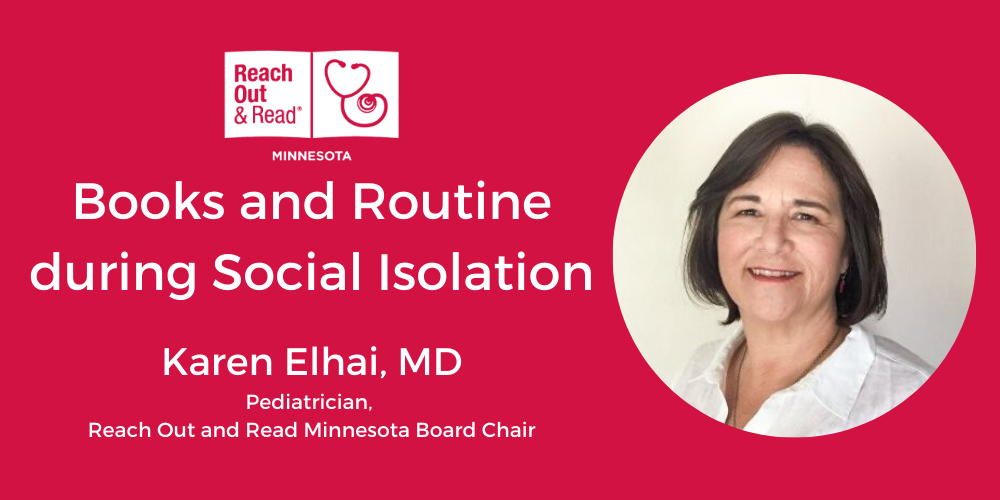
In this moment of pandemic and social isolation, the worlds of parenting and caring for children have been radically changed. We sat down with our board chair, Dr. Karen Elhai to discuss how families can use the power of books and routine to provide comfort and keep their children's brains on track for healthy development.
First of all, thanks so much for taking the time to answer a few questions and share your expertise as a pediatrician with all of our families. It’s a very unsettling time for many families and certainly a demanding time for healthcare workers like you. What do you think is the most important message families, particularly those with young children, need to hear right now?
I think it’s important for us all to acknowledge that life has drastically changed and will continue to change. Uncertainty can be a little scary. It’s okay to tell your kids that you don’t have answers to all their questions, but reassure them that your family will figure things out together. Kids sense stress and anxiety in adults, and so being honest with them while trying to keep your own emotions in check is important. Focus on the positives and the things you can control with yourself and them -- more family time, preparing meals together, volunteering and connecting with your community (and your community is however you define it), and family walks are just a few examples. I’ve heard so many stories from friends and family about how this has forced them to take a hard look at what they value in their family life, and almost every single one of them feels that they have gained a new perspective that they want to keep even as we move toward a new normal. We have been forced suddenly to make big changes in our lives, but change is also an opportunity. Treat it as an adventure with your kids and it will help teach them resiliency, rising to a challenge, and the benefits of working with others to make things better.
Many families right now have found their daily lives totally upended by this crisis. Kids are no longer in school, activities are canceled, many children are no longer attending day care. What is the importance of having regular routines for young children and what are some tips you have for families trying to implement new routines at home?
Routines are incredibly important for the whole family, not just kids! Sticking to regular routines -- or creating new ones for this stay-at-home period -- help reduce stress kids may be feeling about so many big changes by providing some predictability and control to daily life. For the grown ups, routines help reduce stress in much the same way, and mean you don’t have the mental anguish of ‘winging it’ each day. If you’re juggling working at home, online school, and other demands try to figure out what works best for your family. Dinner time with the whole family is a great time to talk about how the day went and make any adjustments to the routine or schedule.
Make it a regular family event to create a weekly schedule and post it where all can follow. Some of the most important routines to keep in mind:
- Try to keep as close as possible to previous bed, waking, and meal times. Regular and adequate sleep is very important for everyone.
- For school-age kids, if possible try to keep ‘regular’ school hours and use evenings for family fun time.
- Incorporate fun breaks. Turn up the music and have a 15 minute dance party! Make a home video to send to family and friends you can’t visit in person right now. Schedule an online video call with your kids’ friends. Of course, reading aloud together is ALWAYS a great break activity for all ages!
- Always include daily exercise and physical, unstructured play time.
- Be sure to incorporate the outdoors into your daily life (while maintaining social distancing, of course). Nature is an incredible stress-reducer and mood regulator, and has also been shown to help learning in kids.
Clearly, here at Reach Out and Read Minnesota, we are big into books! What about sharing a book in particular is so beneficial to young children, especially in a time like this?
Long before COVID19, research increasingly demonstrated that regular book-sharing creates an emotional bond between child and caregiver. It’s the regular ‘lap time’ around the book activity that leads to feelings of love, security, social connection, physical contact and interaction. This builds connections in the brain that lead to improved resilience and help insulate against toxic stress.
With all of the changes wrought by COVID-19, incorporating regular book sharing adds positive emotional interactions to a family’s new routines. The youngest children will want to read the same book over and over, reinforcing their own routine. For older children, books tell stories of favorite characters overcoming difficulties, having good and bad days, finding the fun in everyday encounters, and using imagination, among many other themes and can help them process some of their own fears. You can also find lists of suggested children’s books in a quick internet search that help kids understand COVID-19 itself.
Reading aloud together doesn’t have to be limited to young children. Reading a chapter an evening out loud of a book is a great family activity and routine. I know families that have done this into their child’s adolescent years, with the teen eventually taking on the role of the reader and choosing the book. Some of the books I remember most from my childhood were ones read aloud, such as the first Little House book, Island of the Blue Dolphins, and Ramona the Pest.
Many families might not have access to a large library of children’s books at home. Is it okay to reread the same story multiple times? How can families with fewer resources on-hand help their young ones learn?
Even with a room full of books, most parents will tell you their toddler always picks out the same book every night for a month, much to the parent’s frustration. That’s completely normal. (I’ve had family members try to hide the favorite book because they were sick of it. The subsequent nuclear-level meltdown is not worth trying this at home.) So if a family doesn’t have a large book collection, it usually doesn’t make a big difference to the child. The important thing for them and their brain development is that back and forth interaction with the parent as they go through the book, pointing at things, making the noises, hearing your voice -- that lap time I spoke of earlier. As kids get a little older, you can change some parts of the story as you read the book -- substitute names of people they know, or let them tell you the story from the pictures. Make up songs about the story they’re hearing about. It’s all about the interaction, not the exact words of the book.
Lastly, for many young children (and their adult caregivers) this both a challenging time and pretty boring time. I think many of us are doing a whole lot of sitting around the house! What are some suggestions you have to spice up bedtime stories or add some brain building fun into children’s lives during this time?
Well, you don’t want to spice up bedtime stories TOO much so that it gets them all wound up and becomes play time rather than go-to-sleep routine. Unless, of course, it’s your grandkids. Then the rules are much more relaxed. Same with benevolent aunts and uncles, not that I would have ever done anything like that with my own nieces and nephews…
But outside of bedtime, the big thing for brain building is what is called ‘serve and volley.’ It’s about making the story interactive, not just reading the words on the page and having them sit and listen passively (like that ever happens anyway). Ask them questions, or to point at the pictures. As they get older, act out the story. Make the animal sounds. Use silly voices for the characters. Add surprise tickles now and then.
Singing is another fun brain building activity that can be done on the fly, or when you just have a couple minutes. Sing familiar songs, or make them up as you go. Just talking with your child builds brains. I encourage my patients to talk to their babies starting at birth. Infants are great listeners, so you can tell them about your day, complain about your boss, even talk politics and they won’t argue with you. While they may not understand what you’re saying it’s about hearing your voice and lots of words. They are filing away all that they hear, and intently watching your facial expressions and learning to interpret them. And that includes that weird fish face you make. We know that the more words a child hears in the first three years, the better prepared they are going to start kindergarten with a vocabulary and language skills that help them learn.
- Liam Mackin, Communications Associate
with board chair Dr. Karen Elhai
4/29/20
Interested in learning more about the power of books to build brains and combat toxic stress?
Join us for our Spring Benefit on May 7th
Looking for more family learning resources?
Check out this list from our national office

